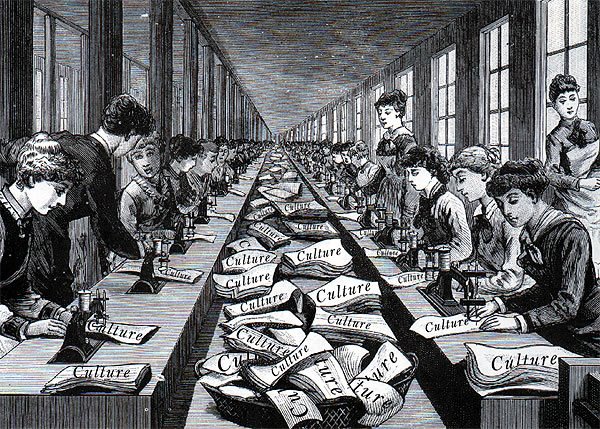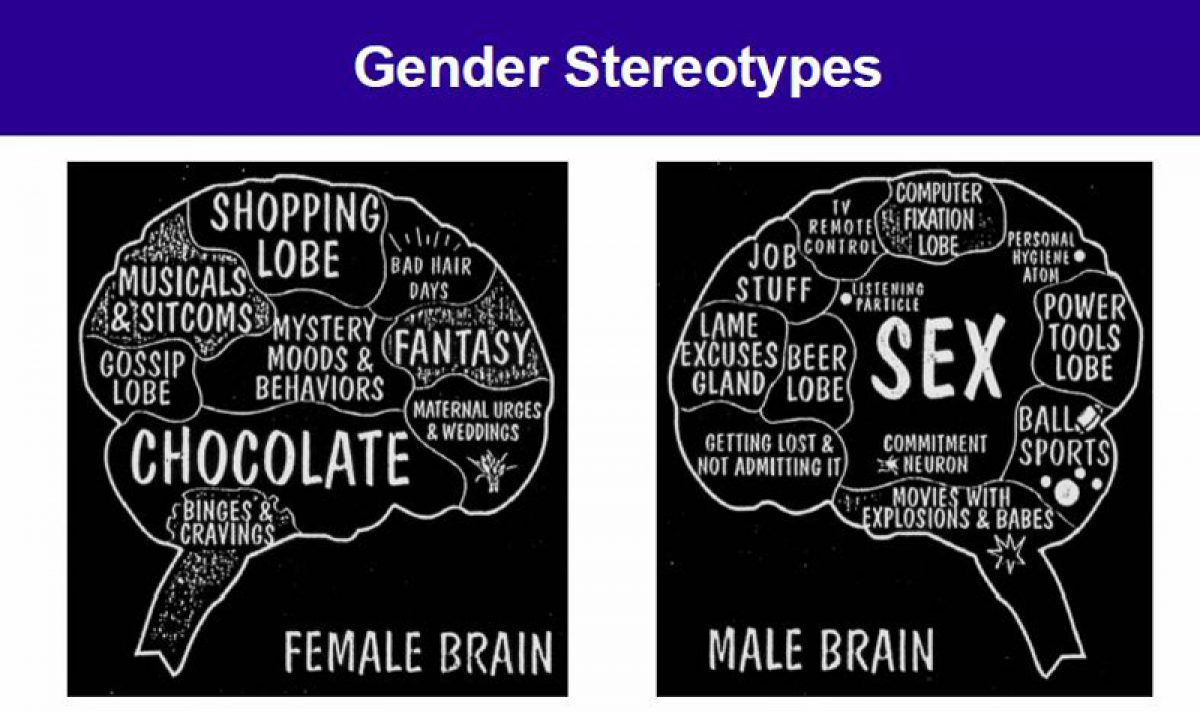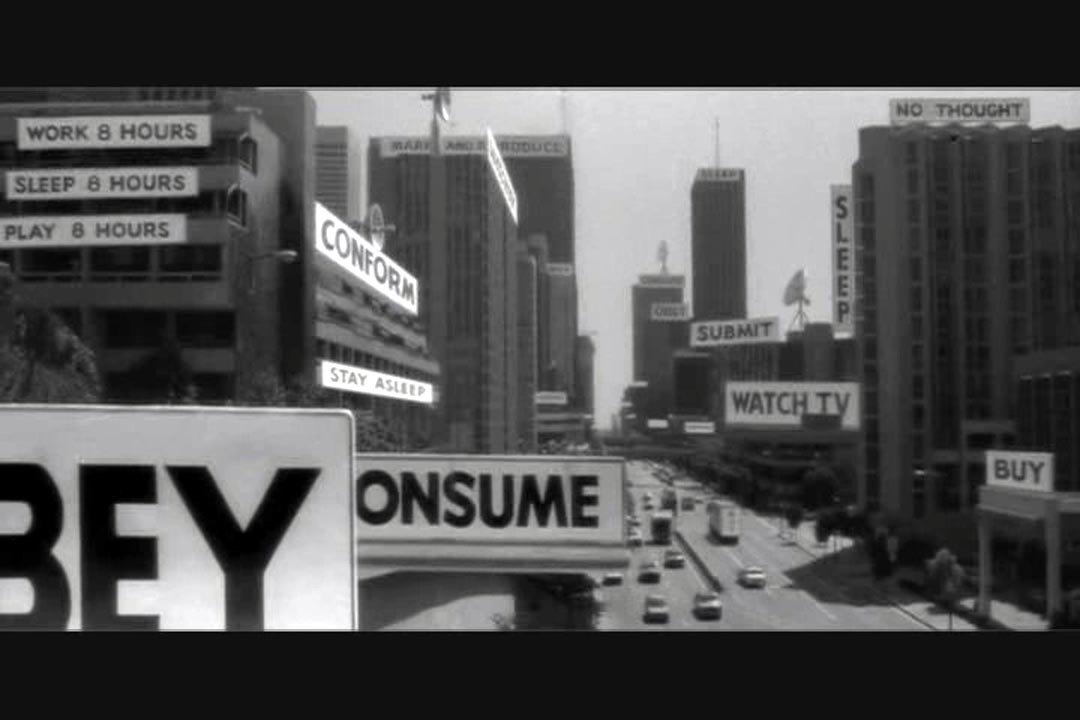Our discussion on advertising reminded me of the Culture Industry and its role in gender socialization and gender advertising.
Culture Industry is the term first coined by Adorno and Horkheimer is their book “Dialectic of Enlightenment”, published in 1947. The authors expand the ideas of Marx and Weber on alienation and rationalization, they state that alienation underwent a transformation in the 20th century to take a form of the production of culture that is designed to keep us consuming and alienated. The culture of consumerism, according to Adorno and Horkheimer, is designed to make the consumer happy. We produce products that are the same (rationalization idea that was taken from Weber) and we express our individuality by consuming virtually the same products, this leads to lack of fulfillment and keeps us alienated. This lack of fulfillment and the fact the most of the products produced are disposable ensures that we keep consuming. The sameness of the products produced perpetuates stereotypical thinking – we know what we are getting and this eliminated the need for thinking and choice. The culture industry is designed to keep us away from each other (we need to communicate less and less), creates false identity defined by the products we consume and often don’t need.

Although not explicitly stated in their book, the same ideas can be applied to “Beauty Industry” that keeps women focused on how they look and what products they need to buy instead of sexism, patriarchy, and inequality.

Adorno, Horkheimer and other thinkers of the Frankfurt school (writing in 1940s-1960s) often criticized various forms of media (such as film, magazines, visual art) for being the carriers of the Culture Industry and they considered other forms of expression “pure”. For example, in his essay “Note on dialectic” Marcuse wrote the following about poetry: “Poetry is thus the power ‘de nier les choses’ (to deny the things) — the power which Hegel claims, paradoxically, for all authentic thought”. Was he right about poetry being somehow purer than other art forms in that it cannot be corrupted, presented outside of its original context and used for manipulation? I think the world of advertising advanced and polluted all forms of expression.
Below are four examples of Levi’s commercials that use poetry for advertising jeans. You can replace jeans with bras, shoes, lipstick, etc. I chose these because they are very good at what they do – they catch viewer’s attention and elicit a specific emotional state in a way that only a poetry can, by watching these it is easy to understand how we are manipulated by advertising without realizing it.
1. Threads

This commercial for Levi’s jeans features a poem written by Erin Swanson of the Wieden + Kennedy ad agency. This poem was specifically written for this commercial and it does a great job of provoking a state of support, self-confidence, and reassurance (something that we all seek) while attempting to convince us that all these are manifested in a pair of pants we wear.
This is a pair of Levi’s, buttons and rivets and pockets and cuffs, and the thread that holds it together.
When the road gets rough and the sky gets jumpy and the stars start falling on top of your head and the waves start breaking against your legs;
It’s the thread in your seams that’s tied to your dreams.
It’s the sole in your feet that keep the beat;
You’re gonna be great, you’re gonna be great, you’re gonna be great;
You’re gonna find the cure, you’re gonna be famous, you’re gonna be shameless.
Spittin’ seeds in the wind, tap dancing with your shoe laces pinned, to the back of a bus at the end of the road, at the bottom of the ninth, with a crown on your head
You’re a queen, you’re a king, you’re the solo act in a sold out show at a six-story stadium, and you’re proud, you’re a hero! You got a hero’s grip. Swingin’ by a single stitch. You follow your heart, follow the leader, you’re the leader;
Are you joking, are you breaking, are you shaking? You’re the next living leader of the world. You’re a kid. Holding onto the thread. That holds it together.
This is a pair of Levi’s
2. The Laughing Heart by Charles Bukowski
This is an original poem written by Charles Bukowski in early 1990s. Henry Charles Bukowski (1920-1994) was a German –born American author and poet. In this poem, he tells us to recognize that our life belongs to us and we should overcome passivity and give ourselves a chance. The poem evokes emotional states of hope, positivity, courage, and empowerment. And, coupled with the commercial, makes us associate these feelings with … wearing jeans.
your life is your life
don’t let it be clubbed into dank submission.
be on the watch.
there are ways out.
there is light somewhere.
it may not be much light but
it beats the darkness.
be on the watch.
the gods will offer you chances.
know them.
take them.
you can’t beat death but
you can beat death in life, sometimes.
and the more often you learn to do it,
the more light there will be.
your life is your life.
know it while you have it.
you are marvelous
the gods wait to delight
in you.
3. America by Walt Whitman
Directed by Cary Fukunaga for Wieden+Kennedy, Portland using a poem by Walt Whitman. Believed to be an original wax recording of Walt Whitman reading four lines of his 1888 poem “America”. This poem speaks of qualities that most human beings (and Americans) value and desire – equality, strength, freedom, love, it evokes patriotism and pride. All we have to do is to wear Levi’s jeans and America will be that perfect idealized country of freedom and equality.
America
Centre of equal daughters, equal sons,
All, all alike endear’d, grown, ungrown, young or old,
Strong, ample, fair, enduring, capable, rich,
Perennial with the Earth, with Freedom, Law, and Love,
A grand, sane, towering, seated Mother,
Chair’d in the adamant of Time.
4. Pioneers! O, Pioneers! by Walt Whitman
Directed by M Blash for Wieden+Kennedy, using a poem by Walt Whitman. Another poem by Whitman, about pioneers, people that are fearless, that are open to new and exciting possibilities, that are explorers, people that many of us aspire to be. All we need is the right pair of jeans.
Full text can be found here



Mila, you pose a very intellectual note in response to the discussion on advertising. The culture industry does indeed reinforce a capitalist ethos. Within society, this concept is seen explicitly through direct advertising on TV, billboards, magazines, social media, etc. It coins an eager desire to fetishize over demanding commodities while controlling the individual consciousness. This has become embedded in our thoughts and lives, without the clear realization of its presence. I really like the examples shown by Mila which display the powerful, and even lethal combination advertising and poetry can have on society’s social standard. While poetry is often appreciated for its pure art form, I believe our present society has discovered a way to poison it its pursuit to capture a mass audience. While appearing innocent on the exterior, these advertisement manipulate the public into believing the cultural idea they intend on selling.
Also in reflection of our analysis in the field of advertisement, I was thoroughly intrigued by Goffman’s precise interpretation of the feminine portrayal. He was able to scrape the illusion by discovering the stark contrasts in the way the two sexes are portrayed. By understanding Goffman’s argument–we are able to understand how our culture and society perceives gender roles on a mass level. The ‘sexy liberation” that is often displayed through feminine posing is actually mistaken for a clear state of oppression. As a society, we have accustomed ourselves to believe there is an ideal look that must be maintained by every women to be placed in the category of “beautiful”. Are we going to continue to allow ourselves to become zombies of this cultural subordination? Or, will we finally open our eyes to the destruction of the feminine woman and erase mass beauty standards once and for all?
LikeLike
When thinking about the affects of advertising I always go back to the documentary ‘Century of the Self’ which chronicles the work and life of Edward Bernays. Bernays pioneered the American advertising world and created the field of public relations. He started creating advertisements as a sort of experiment after creating propaganda during WWI, trying to see if he could elicit the same buying response as he had war support using the same techniques. He is credited with, through his unique approach to advertising, making smoking attractive to women, and the major rise in sales of bacon following WWI. When you look at the beginnings of advertising it is almost too easy to see that it was always meant to elicit psychological reactions from us that spur our purchasing habits.
The problem with this approach to advertising is that it has just gotten worse over the years, it has upheld the unrealistic stereotypes and standards that society could use to be rid of. It has also created a societal cognitive dissonance, everyone knows that the women in magazines are not real, yet we still strive to look like them. We are being sold happiness in the form of products, while simultaneously being told who and what we should be to deserve those products.
LikeLike
Mila, you have portrayed such a detailed and astonishing description to advertisements and the various aspects to advertisements that are used in order to entice the viewer to be interested. As a psychology major i can vouch that advertisements have in fact come to affect the way we think and is also a reflection on how we think. The brain is constantly thinking, both in the conscious and unconscious realms. The goal of marketers is to engage viewers from both the conscious and unconscious realms. often times the viewer would be intrigued the subtle messages that are sent through the ad, the part where the viewer themselves will not be aware of. Its astonishing to think how both sociology and psychology can both tie in together. The examples of the poems that Mila mentioned in my opinion portrays the subtle way in which the marketer has the viewer who is watching the advertisement about jeans to also start feeling as if they really do need a pair of jeans. Not only will the words of the poem make the viewer think about the need for a pair of jeans but later on whenever they hear the same lyrics and or the same word they would automatically start playing the poem in their head and then associate it with the advertisement. That is because the repetition of the advertisement lead for it to be stored into the long term memory.
Another stereotype that always pops into my head when thinking about cultural influences on advertisements are dieting ads. Growing up i was always influenced to see advertisements on yogurts, salads and cheese with a woman who is expressing her desire to become healthier. This lead to be always have an understanding that only women try to lead healthy lifestyles and struggle to lose weight. However from real life experiences i have seen and heard that the struggle to lose weight is not only faced by women but by men as well. (However i barely see men eating yogurt, why is that?)
LikeLike